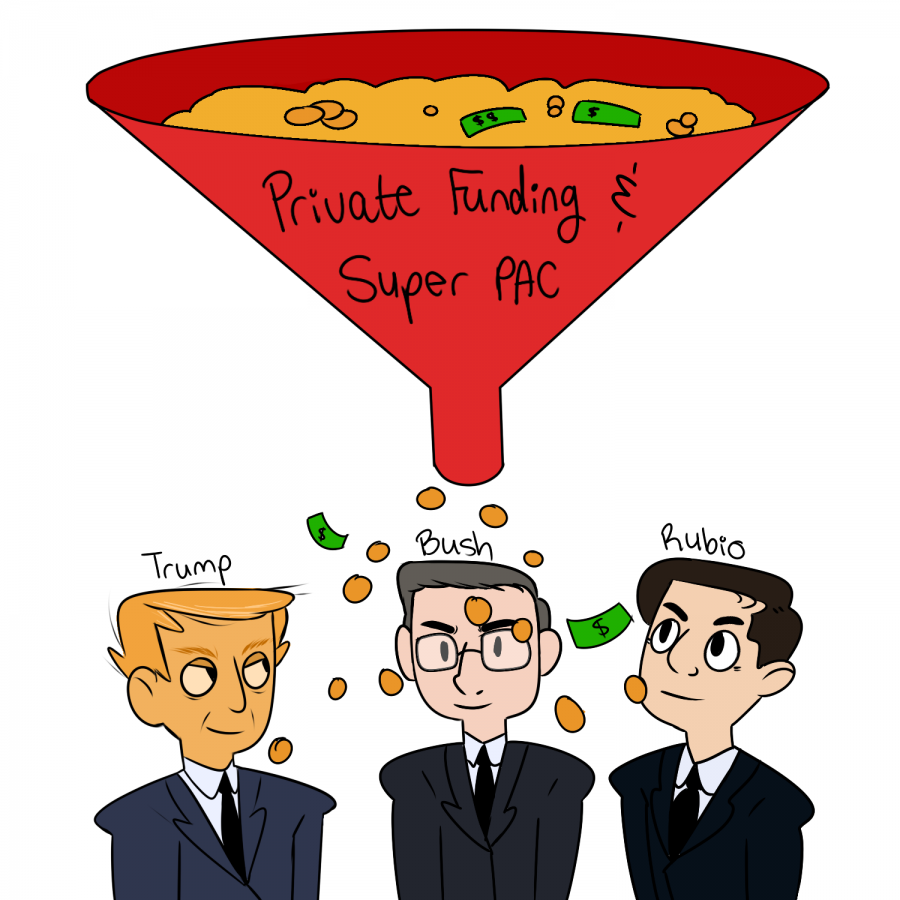Corporations’ large donations to politicians gives unfair advantages
January 13, 2016
Throughout the world, money can acquire one many things; however, a presidential race should not be included in this group. So far throughout the 2016 presidential race, over forty people and companies have donated amounts in excess of one million dollars to one or more candidates, Republican and Democrat.
With nearly $400 million raised during only the first half of 2015, this has been the fastest start to a presidential contest. In a stark departure from previous elections, most of the money is flowing not into the campaigns, but into outside groups like “super PACs” and other political organizations that are allowed to raise unlimited amounts of money from wealthy individuals, labor unions and corporations.
Although nearly $400 million has already been raised, the Republican parties’ largest donors have yet to commit and raise money for their choice of candidate. In early August, the Koch brothers summoned Republican candidate hopefuls, Jeb Bush, Ted Cruz, Scott Walker, and Marco Rubio to convince whom billionaire brothers, Charles and David Koch should elect as their choice for candidate.
In 2012, Charles and David Koch raised at least $407 million for Mitt Romney; this sum nearly matched his original campaign funds. Previously, in 2004 the Koch network raised more than George W. Bush.
According to an analysis from the Washington Post and Center for Responsive Politics, the labryninth of 17 tax-exempt Koch groups shielded wealthy individuals from disclosing their donations, including the exact amount the two billionaires contributed. Undoubtedly, along with these donations come expectations for favors from candidates, some of which include: campaigns to undermine Obamacare, minimum wage, and clean energy and the environment.
Although the Republican candidates do receive many donations, Democratic hopefuls also have their own donors. Hillary Clinton’s tom 10 cumulative donors between 1999 and 2016 were: Citigroup, Goldman Sachs, DLA Piper, JPMorgan Chase, EMILY’s List, Morgan Stanley, Time Warner, Skadden Arps, Lehman Brothers, and Cablevision Systems. These donors are not individual people, but rather banks, large corporations, and media.
The largest democratic donors are Fred Eychaner, who donated $8.1 million during the 2012 election, James Simons and wife Marilyn, contributed $7.7 million, and Harold Simmons and his wife Annette, who funded $19 million.
These large donors hid behind freedom of speech; however, this does not mean the freedom to buy the United States government. This predicament started in 2010 when the Supreme Court ruled 5-4 on Citizens United act, allowing corporations and the wealthy to spend unlimited and undisclosed money to buy elected officials.
Because of this ruling, the political system is under attack. Billionaire families such as the Koch brothers are able to spend however much money they wish to buy candidates of their choice. In the 2016 presidential election, the Koch brothers plan to spend around $900 million, which is more money than both Democrat and Republican parties, spent in the last election. The only way to overturn this way is for Congress to pass a constitutional amendment in order to overturn Citizens United.
Though money does play a large amount in politics, some presidential nominees are weary of this. Donald Trump, John Kasich, Carly Fiorina, Rick Santorum, Scott Walker, Ben Carson and Marco Rubio have acknowledged there is a problem, but do not have a solution. Three democratic candidates- Hillary Clinton, Martin O’Malley and Bernie Sanders have endorsed some version of publicly funded elections to encourage participation of small donors. Many Republic candidates have all endorsed increasing disclosure of donors; However, they all preface their support for disclosure on eliminating all contribution limits for donating to candidates and parties.
These large amounts of money donated to presidential candidates must be replaced with donations from public funds and smaller donors. Single corporations or groups of millionaires should not be allowed to buy the nominee for their given party. Democracy is meant to be a people’s election and this quality of democracy is being taken away from the people when larger than life corporations select their favorite nominee and back him or her with enormous amounts of money.

